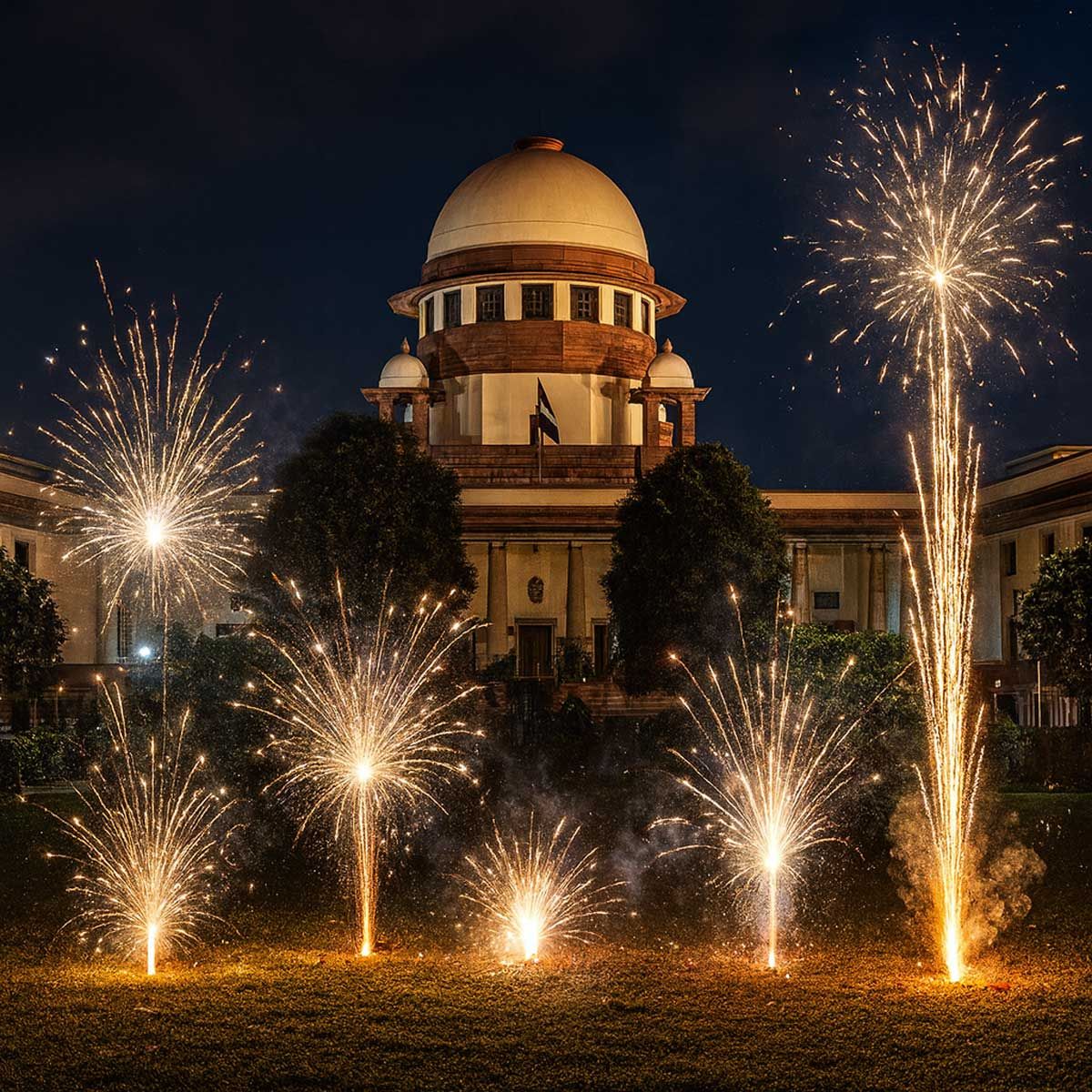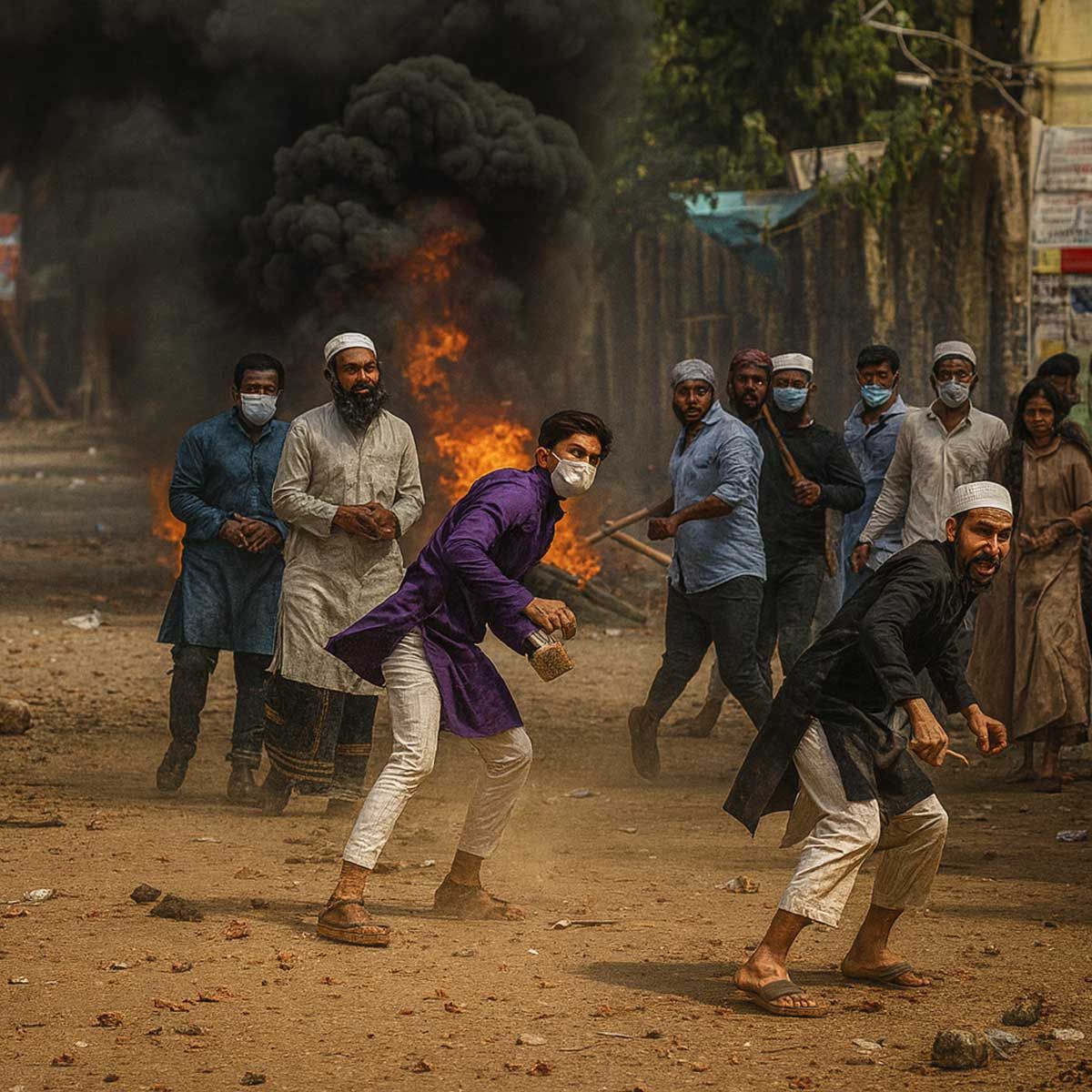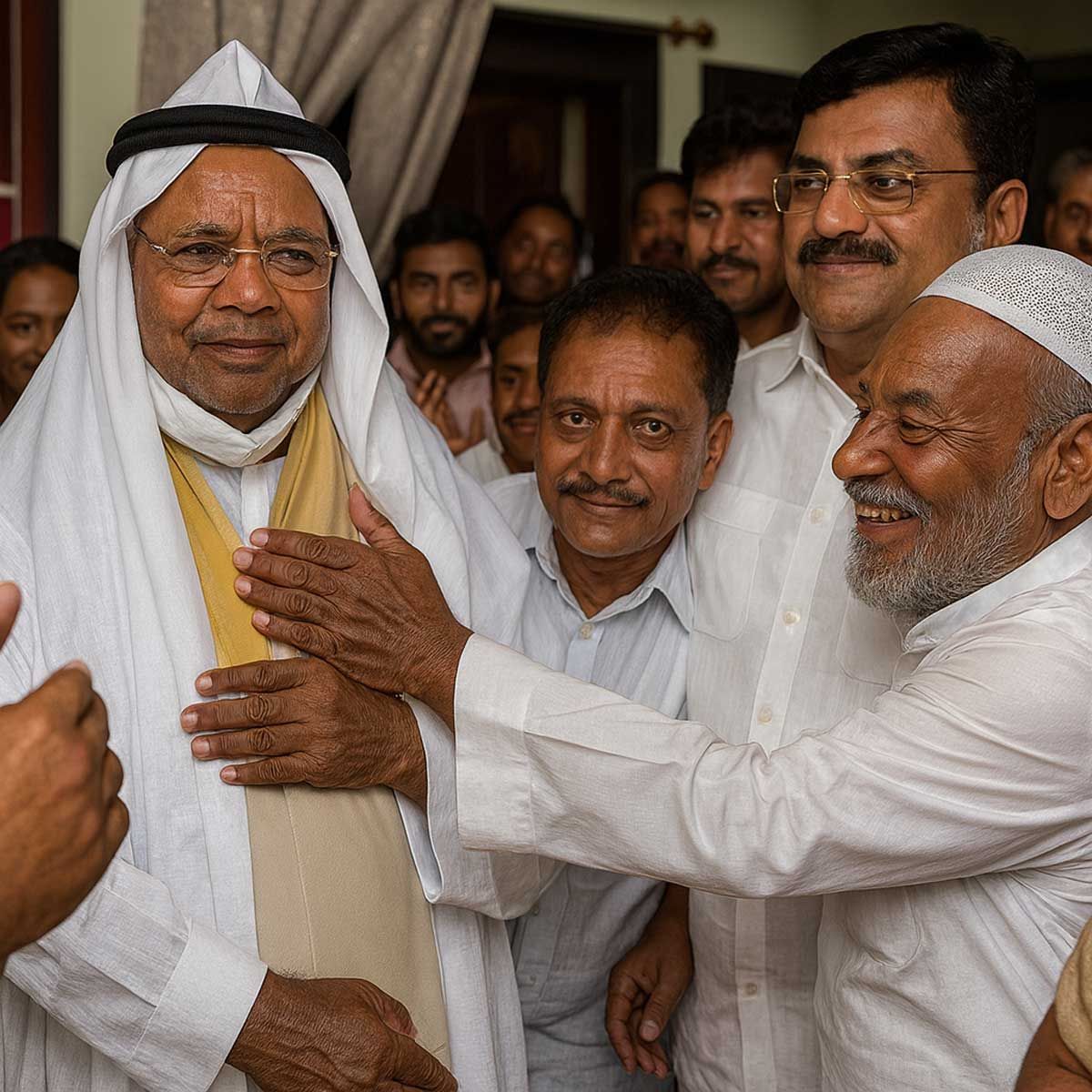More Coverage
Twitter Coverage
Satyaagrah
Written on
Satyaagrah
Written on
Satyaagrah
Written on
Satyaagrah
Written on
Satyaagrah
Written on
JOIN SATYAAGRAH SOCIAL MEDIA
"Greed's Silent Downfall": Only 454 crores cash and 60 kg of gold so far, the BJP claims, 'Dhiraj Sahu is from Jharkhand, but the BJD govt in Odisha is running his liquor empire in several districts to fund election campaigns,' may impact Odisha politics

In an unprecedented move, Income Tax officials have extended their relentless investigation into the financial affairs of Jharkhand Congress MP, Dhiraj Sahu, entering the sixth consecutive day as of December 11th. The focus of their operations remains Baldev Sahu and Sons Pvt Ltd, a liquor manufacturing and trading company intricately linked to Boudh Distilleries Pvt Ltd. The latter is known to be operated by family members and close relatives of Dhiraj Sahu.
|
The scale of the ongoing raids has stunned the nation, with the latest reports from Odisha revealing a staggering total of 454 crores and 50 lakhs seized from various premises associated with Dhiraj Sahu. Notably, a substantial sum of 448 crores and 50 lakhs was unearthed from locations within Odisha alone.
Breaking down the colossal figures, it has been disclosed that approximately 400 crores were discovered in Balangir, a significant portion of the seized assets. Furthermore, 37.5 crores were recovered from Sambalpur, and an additional 11 crores were found in Titilagarh. These findings paint a vivid picture of the extensive financial activities intertwined with the Sahu family's business ventures.
The investigation's intensity has not waned, and as each day unfolds, more layers of this intricate financial web are exposed. The authorities seem determined to leave no stone unturned as they delve into the labyrinth of transactions connected to Baldev Sahu and Sons Pvt Ltd. As the nation watches this unfolding saga, the gravity of the situation becomes increasingly evident, raising questions about the source and legitimacy of such colossal sums of money.
The ongoing Income Tax raids have not only laid bare an astronomical cash reserve but have also unveiled a substantial amount of gold. According to a detailed report by Kanak News, a staggering 60 kilograms of gold have been seized from both the Balangir premises of Baldev Sahu and Sons Pvt Ltd and the residences of the individuals involved in the ongoing investigation.
|
In a parallel development, the scrutiny has extended beyond Odisha's borders, with 6 crores discovered in Jaiswal traders located in Jharkhand. This underlines the wide-reaching implications of the financial dealings under investigation, stretching across state lines and implicating various entities associated with the Sahu family's business network.
The sheer scale of these operations is mind-boggling, with reports indicating that a total of 37 teams from the Income Tax department simultaneously conducted raids at 37 different locations in Jharkhand and Odisha. This synchronized effort underscores the gravity of the allegations and the depth of the financial irregularities being probed.
The revelation that this cash haul is the largest in the last 42 years adds another layer of significance to the unfolding events. The magnitude of the seized assets raises crucial questions about the duration and extent of the alleged financial improprieties. The nation now watches with bated breath as investigators meticulously sift through the evidence, aiming to bring clarity to a case that has captured the attention of the public and shaken the foundations of trust in the system.
|
BJP Alleges Cross-Border Influence: Impact of I-T Raids on Odisha Politics
As the Income Tax raids on the liquor empire of Jharkhand MP Dhiraj Sahu continue into their 6th day, political ramifications are starting to surface, particularly in the state of Odisha. The Bharatiya Janata Party (BJP) has stirred the pot by asserting, "‘Dhiraj Sahu is from Jharkhand, but BJD govt in Odisha is running his liquor empire." This bold claim raises eyebrows and prompts a closer examination of the intricate connections between the Sahu family's business operations and the political landscape in Odisha.
The epicenter of the massive cash seizure is Balangir, a town nestled in the western part of Odisha. The focal point of the raids is a Bhatti, a liquor manufacturing unit located in Balangir, where a substantial amount of cash, meticulously loaded in 176 bags, has been discovered. The counting process has been underway for five days at the main State Bank of India branch in the city, highlighting the sheer volume of the seized funds. Despite the initial haul, the raids persist on various office and factory premises of Baldev Sahu and Sons Ltd, as well as on the residences of the company's owners.
Balangir, once an obscure town to most Indians, has now become synonymous with the staggering revelations emerging from the ongoing investigations. The images and videos of almirahs overflowing with currency notes, which have gone viral on social media and TV news, are not from Jharkhand but from Balangir. The significance of this location adds a layer of complexity to the unfolding narrative, raising questions about the extent of cross-border financial dealings and the impact on both the political and economic fabric of the region.
|
It's crucial to note that while Dhiraj Sahu, the Congress MP at the center of the storm, hails from Jharkhand, the majority of the seized cash originates from towns in Western Odisha, such as Balangir, Sambalpur, and Titilagarh.
The Income Tax department's scrutiny extended to Boudh Distilleries Pvt Ltd, revealing a web of interconnected companies linked to Dhiraj Sahu's sprawling liquor empire. Among these entities, Balangir's Baldev Sahu and Sons Pvt Ltd emerged prominently, having been in partnership with Boudh Distilleries Pvt Ltd. This collaboration further underscores the complexity of the business relationships under investigation.
Reports indicate that several companies share intricate ties with Dhiraj Sahu, originating from different sectors of the alcohol industry. Notable names include S Shiw Ganga and Company, BDPL, Baldev Sahu Infra Private Limited, Kwality Bottlers Private Limited (IMFL Botting), Kishore Prasad Vijay Prasad Beverages Private Limited, and others. The revelation of these associations sheds light on the extensive reach of Dhiraj Sahu's business network, creating a mosaic of financial interdependencies.
Boudh, a tribal-dominated district in central Odisha, emerged as a significant focal point of the investigation. Dhiraj Sahu's son, Ritesh Sahu, holds the position of Managing Director at Boudh Distilleries Pvt Ltd, while his elder brother, Uday Shankar Prasad, serves as the chairman. This family-centric management structure adds a personal dimension to the unfolding narrative, highlighting the familial ties within the heart of the alleged liquor empire.
|
The shockwaves from the massive cash seizure have reverberated not only through the ranks of Income Tax officials but also among the public at large. The realization of the magnitude of Dhiraj Sahu's liquor empire, spanning across several districts of Odisha, has prompted questions about the implications for the ruling party in Odisha.
The seismic revelations from the Income Tax raids on Jharkhand MP Dhiraj Sahu's liquor empire have injected a new dynamic into Odisha politics. A crucial question echoes in the public discourse: "Can a Jharkhand businessman-turned-politician operate such a vast liquor business without active political patronage from ruling party politicians in Odisha?" This inquiry is gaining momentum, sparking intense debates about the interplay between business and politics in the state.
The visuals of unprecedented amounts of cash, almirahs brimming with currency notes, and bank branches struggling to keep up with the influx of seized funds dominate the news space. These striking images serve as a stark reminder of the magnitude of the alleged financial irregularities and raise concerns about the possible influence of political figures in facilitating such a vast liquor empire.
|
BJP MP from Sundargarh, Kusum Tete, has taken a bold stance by openly suggesting that the sprawling liquor empire in Odisha has links to local leaders of the ruling Biju Janata Dal (BJD). Tete asserts that she has consistently raised this issue in the assembly, expressing concerns about the alleged connections between Dhiraj Sahu's business operations and influential figures within the BJD. Despite her efforts to bring attention to these matters, the BJD government, according to Tete, has not addressed her concerns.
In a specific and pointed claim, Tete names BJD's former MLA Jogesh Singh, asserting his purported links to Dhiraj Sahu's liquor empire. She reveals that the liquor manufacturing units were previously registered in the name of Singh's mother, adding a layer of intrigue to the unfolding narrative. Tete's repeated attempts to highlight these alleged connections in the assembly have seemingly fallen on deaf ears, raising questions about the government's responsiveness and transparency in addressing issues of this magnitude.
Jharkhand MP's Liquor Empire Extends Its Reach Across Odisha Districts
The sprawling liquor empire of Jharkhand MP Dhiraj Sahu has left a lasting imprint on several districts of Odisha, with the epicenter of the massive cash discovery being the liquor manufacturing units of Baldev Sahu and Sons in Sudpada, Balangir, a town in Western Odisha. The gravity of the situation is evident in the fact that the largest amount of cash was unearthed from these premises.
As of December 10th, the State Bank of India branch in Balangir confirmed the completion of the arduous task of counting the cash meticulously loaded in 176 bags. This extensive counting process, involving dozens of bank staff and counting machines, spanned over five days, highlighting the sheer volume of seized funds. According to reports from Odisha, the total amount of cash seized from various locations in the state surpasses a staggering 400 crores, accompanied by the discovery of nearly 60 kilograms of gold.
The investigative net widened further as two more liquor traders, reportedly relatives of Dhiraj Sahu, namely Deepak Sahu and Sanjay Sahu, faced raids in Titilagarh, a town in the Balangir district. The Income Tax department seized a substantial sum of 11 crores in cash from the premises of the Sahu brothers during these operations. Simultaneous raids at the Sambalpur unit of the company resulted in the discovery of an additional 37.5 crores in cash.
|
The political undercurrents of this case gained visibility with Union Minister Dharmendra Pradhan's remarks in Odisha. Though not explicitly naming individuals, Pradhan hinted at the alleged misappropriation of money, stating that it has been "looted from the poor people of Odisha." He further emphasized that the Modi government is committed to ensuring accountability for those connected with the "family business" of the Congress leader, Dhiraj Sahu. These comments suggest that the political fallout from the ongoing investigations may have far-reaching consequences, with key figures in the government signaling a determination to bring those implicated in the case to public scrutiny and justice.
In a press conference held in Bhubaneswar, the Bharatiya Janata Party (BJP) escalated its accusations, shedding light on the alleged intricate connections between Jharkhand MP Dhiraj Sahu's liquor empire and the ruling Biju Janata Dal (BJD) government in Odisha. State spokesperson Lekhashree Samantsinghar directly implicated senior leaders and ministers in the BJD government, asserting that while Sahu may be the owner of the companies, the actual management of his liquor empire in Odisha was being orchestrated by the ruling party.
She questioned the roles of key law enforcement agencies, asking, "What was the Vigilance, Crime Branch, Excise, EOW doing when the company was amassing such wealth, and how the state government had no information about it?" These pointed queries underscore the gravity of the situation, raising concerns about potential lapses in oversight and governance at various levels. Samantsinghar went on to claim that the liquor business in question served as a significant source of funding for the BJD during elections, further amplifying the political ramifications of the ongoing revelations.
As the news of these allegations reverberates across the state, local news channels in Odisha are abuzz with political whispers and public concerns. Some individuals have asserted that the money from the liquor empire constitutes a major source of political funding in the state. Notably, there are claims that the Odisha government has not issued fresh tenders for liquor outlets in the last 25 years, with select traders allegedly obtaining renewed licenses every year. These allegations raise questions about the transparency and fairness of the state's liquor policy, with suggestions that it may be designed to favor manufacturers of country liquor, as the funds generated from these businesses are purportedly channeled to support the ruling party.
|
As the political storm intensifies in Odisha, the names of several leaders from the ruling Biju Janata Dal (BJD) are surfacing in connection with the Sahu brothers. Ministers Tukuni Sahu (Titilagarh), Niranjan Pujari (Sonepur), Rajendra Dholakia (Nuapada), and Pradip Amat (Boudh) are now under scrutiny, with the BJP and various local news outlets alleging their involvement as beneficiaries of the extensive liquor trade and country liquor manufacturing units proliferating across the state.
Accusations have been amplified by reports from Odia channel Argus News, claiming that liquor traders regularly made payments to BJD leaders and provided vehicles, cash, and liquor during election campaigns. These purported financial ties between the liquor empire and influential political figures suggest a complex interplay between business and politics, raising concerns about the integrity of the political process and the potential influence of financial contributions.
In response, the BJP has announced plans to organize protests in every subdivision of the state, intending to demand answers from BJD leaders implicated in the allegations. The party's decision to take its grievances to the streets indicates a heightened level of political tension and a determination to hold those allegedly involved accountable for their actions.
Amidst the ongoing investigations, reports suggest that Income Tax raids have yielded a crucial piece of evidence—a 'red diary' seized from the premises of liquor traders. This diary reportedly contains names of numerous government officials, politicians, and powerful individuals who were purportedly on the payrolls of the liquor empire.
|
On the national stage, Prime Minister Narendra Modi's tweet underscores the government's commitment to ensuring accountability in the wake of the massive revelations surrounding the liquor trade. His statement, "every paisa looted from the people will be accounted for," signifies a determination to address the alleged financial misappropriations and political implications linked to the liquor empire. This tweet serves as a clear indication that the central government is closely monitoring the situation and intends to uncover any political dimensions connected to the ongoing investigations.
The Bharatiya Janata Party (BJP) has swiftly taken action, initiating protests against the Congress in response to the unfolding scandal. This proactive approach aligns with the party's commitment to highlighting and addressing issues of public concern, especially those involving alleged financial irregularities and political connections. The protests underscore the political ramifications of the case and the BJP's determination to ensure accountability within the political landscape.
Reports have surfaced suggesting that the Enforcement Directorate (ED) might step in to conduct further investigations into the case, considering the substantial amount of money involved and the potential political links at play. The ED, known for its role in probing financial offenses, could bring an additional layer of scrutiny to the unfolding saga. If initiated, this investigation might delve into the intricate financial transactions, exploring potential violations of economic laws and regulations. Such a move could shed more light on the complex web of financial and political dynamics surrounding the liquor trade and its alleged influence on the political landscape in Odisha.
|
As the nation awaits further developments, the ongoing revelations from the Income Tax raids have not only brought to light the massive financial dealings of the liquor empire but have also exposed the intricate connections between business and politics. The coming days will likely witness intensified scrutiny, increased public discourse, and potentially more significant actions from both the state and central authorities to address the multifaceted aspects of this evolving narrative.
 |
 Support Us
Support Us
Satyagraha was born from the heart of our land, with an undying aim to unveil the true essence of Bharat. It seeks to illuminate the hidden tales of our valiant freedom fighters and the rich chronicles that haven't yet sung their complete melody in the mainstream.
While platforms like NDTV and 'The Wire' effortlessly garner funds under the banner of safeguarding democracy, we at Satyagraha walk a different path. Our strength and resonance come from you. In this journey to weave a stronger Bharat, every little contribution amplifies our voice. Let's come together, contribute as you can, and champion the true spirit of our nation.
 |  |  |
| ICICI Bank of Satyaagrah | Razorpay Bank of Satyaagrah | PayPal Bank of Satyaagrah - For International Payments |
If all above doesn't work, then try the LINK below:
Please share the article on other platforms
DISCLAIMER: The author is solely responsible for the views expressed in this article. The author carries the responsibility for citing and/or licensing of images utilized within the text. The website also frequently uses non-commercial images for representational purposes only in line with the article. We are not responsible for the authenticity of such images. If some images have a copyright issue, we request the person/entity to contact us at This email address is being protected from spambots. You need JavaScript enabled to view it. and we will take the necessary actions to resolve the issue.
Related Articles
- Nationalist Congress Party MP Supriya Sule makes false statements about vaccine manufacturing and ridicules Defence Research and Development Organization in Parliament: Details
- Wikileaks and 5 lesser know facts of Indira Gandhi: Nuclear technology, corruption and foreign relations
- Haryana CM Manohar Lal Khattar stated that ‘Namaz in open spaces will not be tolerated in Gurugram’
- ISRO mum on 684 staff dead: 197 suicides and 1,733 deaths at India's nuclear establishments in last 15 yrs
- NIA team of 3 members reaches Canada to investigate terrorist org SFJ, other pro-Khalistani groups and their foreign funding links
- Gandhi emphasized that he won't salute Indian National Flag if Charkha is replaced by Ashoka Chakra and wanted British flag added to it
- Congress leader spreads vaccine hesitancy again, this time claims newborn calves are slaughtered for their serum. Here is the truth
- Congress Govt in Rajasthan has erased evidence from the spot where the specially-abled minor girl was found abandoned at Tijara flyover in Alwar: NCW chief says FIR should be lodged against Rajasthan govt
- Nehru lost election and became first Prime Minister of free India: All thanks to miraculous Gandhi
- On 16th Aug 1946, during Ramzan's 18th day, Direct Action Day aimed to provoke Muslims by mirroring Prophet Muhammad's victory at Badr, Gopal 'Patha', the Lion of Bengal, heroically saved Bengali Hindus & Calcutta from a planned genocide, altering history
- “Prepare to be sued”: Former IFS officer Lakshmi M Puri shuts up Congress supporter Saket Gokhale for misleading allegations against her
- "A man's most open actions have a secret side to them": Regime Change Operation - Rahul Gandhi went to White House in secret meetings that were kept under wraps, also met Donald Lu, Assistant Secretary of State for South Asia in the State Department
- Rajiv Gandhi’s vanity project: How the PMO was renovated and beautified months after the Bhopal Gas tragedy
- Ghost from the past: Unseen picture of Nehru voting in favour of partition of India goes viral
- A Tale to revisit: Robert Vadra disowned his family publicly and then followed mysterious deaths




























